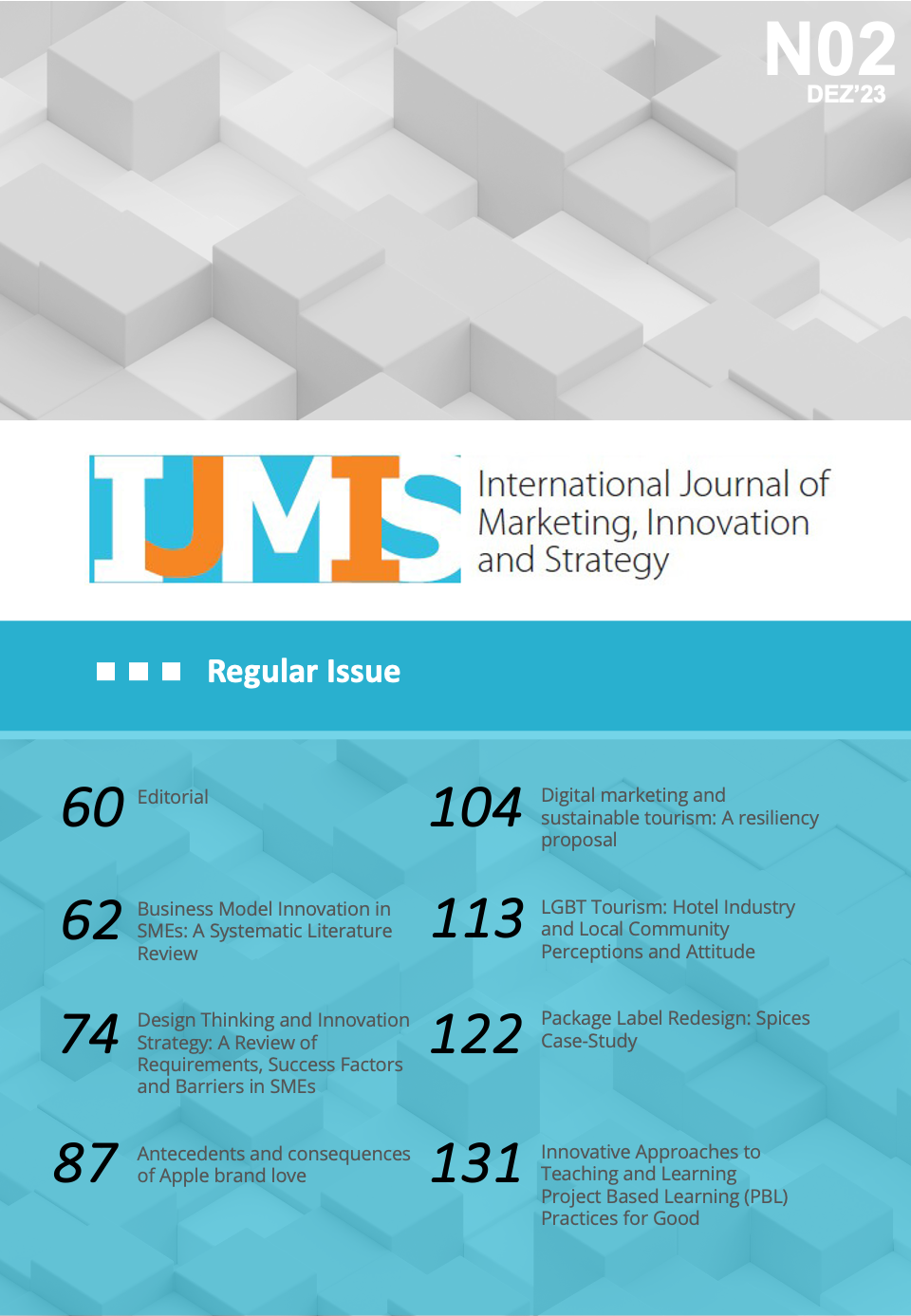Editorial
Abstract
In the second edition of our journal, we start with a selection of scholarly works encompassing five traditional papers: two systematic literature reviews related to innovation in business models and design thinking, and three empirical papers focused on marketing and tourism. Notably, this edition marks the inauguration of a new section titled "Innovation in Teaching & Learning," dedicated to showcasing papers related to innovative teaching methodologies and projects implemented in higher education, aligning with the focal areas of our journal. Two additional papers bring into spotlight distinctive teaching and learning initiatives undertaken in two higher education institutions.
Kicking off the edition is Lucio Marques Peçanha's comprehensive systematic literature review, centering on business model innovation in small and medium-sized enterprises (SMEs). Employing a final sample of 122 records from Web of Science, the author utilized R software and VOS Viewer for bibliometric analysis, identifying five clusters. Through content analysis, these clusters were characterized, culminating in the development of a theoretical framework for SMEs' business model innovation.
The second paper belongs to Fatma Demir and colleagues. The authors focused on SMEs and developed a systematic literature review on design thinking and innovation strategy, presenting a systematic literature review on design thinking and innovation strategy. Drawing from a final sample of 70 papers sourced from Web of Science – Current Contents, the authors leveraged Endnote for descriptive statistics and NVivo for content analysis. The paper identifies prerequisites for implementing design thinking in SMEs, shedding light on success and failure factors.
The third contribution, authored by Anabela Marcos and Ana Rita Silva, explores the antecedents and consequences of Apple brand love. Based on a questionnaire-based survey with 215 respondents, the authors applied structural equation modeling. Their findings underscore the pivotal role played by the hedonic attribute of the product, brand experience, and brand satisfaction in fostering Apple brand love, which, in turn, contributes to loyalty and positive word-of-mouth.
The fourth paper belongs to Luzia Arantes, who focuses on digital marketing and sustainable tourism. Using structural equation modelling, she analyzes data collected through a questionnaire-based survey involving 422 respondents. The results reveal the role of sustainable measures in influencing tourists' adoption of sustainable behaviors. The ensuing model delineates the advantages of digital marketing and social networks in fostering a resilient environment for the tourist market in Portugal.
The fifth and final traditional paper, co-authored by Sónia Sousa-Silva and Laurentina Vareiro, investigates the perceptions of hospitality professionals and local communities regarding LGBT tourism. Combining data from 143 accommodation units in northern Portugal and an online questionnaire survey with 240 respondents, the study identifies discriminatory behaviors towards LGBT tourists that warrant correction. While the local community displays overall hospitality towards LGBT tourism, instances of reluctance and discrimination, particularly among males with lower education levels, were identified.
In the newly introduced "Innovation in Teaching & Learning" category, Liliana Vitorino and colleagues share their experiences with the Case-Based Learning (CBL) method. Implemented in a Design and Marketing of New Products class at Leiria Polytechnique Institute, undergraduate students collaborated on developing sustainable packaging to address a company challenge over a two-month period. Both the company and the students indicated they were satisfied with the results.
Concluding this edition is a paper by Sandra Filipe and colleagues, detailing an innovative project undertaken at Universidade de Aveiro. Involving three teachers and 300 students from the bachelor’s in marketing (second and third year) and master’s in competitiveness and business development (first year), the project focused on sustainability concepts and sustainable development goals. Incorporating diverse teaching and learning methods, interactive technologies (Kahoot! and Padlet), and real-world applications, the results were positively assessed by both students and teachers.
We extend our gratitude to all contributing authors, the editorial team, reviewers, and our community for their invaluable support in shaping this second edition. We trust that these seven papers will serve as a valuable resource for scholars interested in the realms of marketing, innovation, and forward-looking pedagogy.
Happy readings!
Copyright (c) 2023 According to CC Attribution 4.0.

This work is licensed under a Creative Commons Attribution 4.0 International License.
Authors retain copyright and grant the journal the right of first publication with the work simultaneously licensed under a Creative Commons CC BY 4.0.


